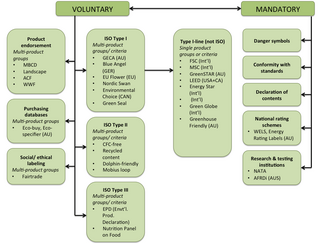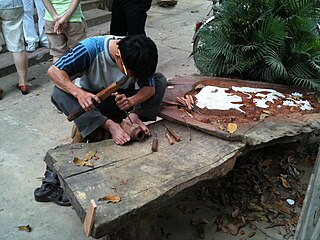The Proclamation of Masterpieces of the Oral and Intangible Heritage of Humanity was made by the Director-General of UNESCO starting in 2001 to raise awareness of intangible cultural heritage and encourage local communities to protect them and the local people who sustain these forms of cultural expressions. Several manifestations of intangible heritage around the world were awarded the title of Masterpieces to recognize the value of the non-material component of culture, as well as entail the commitment of states to promote and safeguard the Masterpieces. Further proclamations occurred biennially. In 2008, the 90 previously proclaimed Masterpieces were incorporated into the new Representative List of the Intangible Cultural Heritage of Humanity as its first entries.

Ecolabels and Green Stickers are labeling systems for food and consumer products. The use of ecolabels is voluntary, whereas green stickers are mandated by law; for example, in North America major appliances and automobiles use Energy Star. They are a form of sustainability measurement directed at consumers, intended to make it easy to take environmental concerns into account when shopping. Some labels quantify pollution or energy consumption by way of index scores or units of measurement, while others assert compliance with a set of practices or minimum requirements for sustainability or reduction of harm to the environment. Many ecolabels are focused on minimising the negative ecological impacts of primary production or resource extraction in a given sector or commodity through a set of good practices that are captured in a sustainability standard. Through a verification process, usually referred to as "certification", a farm, forest, fishery, or mine can show that it complies with a standard and earn the right to sell its products as certified through the supply chain, often resulting in a consumer-facing ecolabel.
International education refers to a dynamic concept that involves a journey or movement of people, minds, or ideas across political and cultural frontiers. It is facilitated by the globalization phenomenon, which increasingly erases the constraints of geography on economic, social and cultural arrangements. The concept involves a broad range of learning, covering, for instance, formal education and informal learning. It could also involve a reorientation of academic outlook such as the pursuit of "worldmindedness" as a goal so that a school or its academic focus is considered international. For example, the National Association of State Universities prescribes the adoption of "proper education" that reflects the full range of international, social, political, cultural, and economic dialogue. International educators are responsible for "designing, managing, and facilitating programs and activities that help participants to appropriately, effectively, and ethically engage in interactions with culturally diverse people and ideas."

Piteado is an artisan technique where pita or ixtle is embroidered onto leather in decorative patterns. The technique is used to make belts, sandals, hair bands, saddles, and other leather accessories. The technique is popular in Mexico and Central America, and typical designs include flowers, animals, charreada, and Pre-Hispanic symbols.

The Rainforest Alliance is an international non-governmental organization (NGO) with staff in more than 20 countries and operations in more than 70 countries. It was founded in 1987 by Daniel Katz, an American environmental activist, who serves as the chair of the board of directors. The NGO states that its mission is “to create a more sustainable world by using social and market forces to protect nature and improve the lives of farmers and forest communities.” Its work includes the provision of an environmental certification for sustainability in agriculture. In parallel to its certification program, the Rainforest Alliance develops and implements long-term conservation and community development programs in a number of critically important tropical landscapes where commodity production threatens ecosystem health and the well-being of rural communities.
One Tambon One Product (OTOP) is a local entrepreneurship stimulus program designed by Thailand's former Prime Minister Thaksin Shinawatra during his 2001-2006 Thai Rak Thai government. The program aimed to support locally made and marketed products of each of Thailand's 7,255 tambons (sub-district). Drawing its inspiration from Japan's successful One Village One Product (OVOP) program, the OTOP program encourages village communities to improve the quality and marketing of local products, selecting one superior product from each tambon to receive formal branding as its "starred OTOP product". It provides both a local and national stage to the promote these products. OTOP includes a large array of local products, including traditional handicrafts, cotton and silk garments, pottery, fashion accessories, household items, and foods. After a military junta overthrew Thaksin's government in 2006 following an election cancelled for irregularities, the OTOP program was cancelled. However, it was soon revived and rebranded.

Kim Bồng woodworking village is a village located in Cẩm Kim commune, Hội An, Quảng Nam Province, most notable for its carpentry and traditional woodworking products. Established in the 15th century, it reached its peak in the 18th century, during which time village craftsmen contributed their skills in woodworking to many different projects, including the Imperial capital in Huế. Using their shipbuilding skills, they supplied ships and ghe bầu for the activities of the busy commercial port of Hội An.
Since 2004, the International Folk Art Market has hosted more than 1000 master folk artists from 100 countries in the world's largest exhibition and sale of works by master folk artists. Artist earnings have exceeded $34 million and impacted more than one million lives in the communities they represent. The Market offers folk artists a respected spot in the global marketplace to gather together and share their handmade traditions and to create economic, social, and individual empowerment.

Sandro Calvani, is the Senior Adviser on Strategic Planning for the Mae Fah Luang Foundation, Bangkok, Thailand.
International Resources for Fairer Trade (IRFT) is a non-profit organisation registered as a Public Charitable Trust under the Bombay Public Charitable Trust Act. It was founded by Kirit Dave and Jan Simmonds in October 1995. Vinita Singh was the first Director of IRFT during the period 1996-2002 and tied up with DFID, and Traidcraft. Arun Raste succeeded her as the Director in IRFT and was heading the organisation till 2008, during which time IRFT opened 2nd office in Hyderabad and forged partnership with Hivos, BTC and Oxfam. During the tenure of Arun Raste, IRFT also forged partnerships with SAI, FLO, Better Cotton Initiative and FLA.

Laotian women have long been active participants in their nation's society, involved in politics, driving social transformation and development, becoming active in the world of business and serving as nurses and food producers for the military. Due to modernization and rural uprooting, Lao women have begun to embrace lifestyles that are foreign to traditional Laotian ideals.

Artisans Angkor is a Cambodian social business creating job opportunities for young people in rural areas, while reviving traditional Khmer craftsmanship.
Sustainable products are those products that provide environmental, social and economic benefits while protecting public health and environment over their whole life cycle, from the extraction of raw materials until the final disposal.
The Cooperation for Fair Trade in Africa (COFTA) is an organized social movement that aims to eliminate poverty through the fair distribution of profits during international trade.

Kailash Chandra Meher is an Indian artist, inventor, and social activist. He is a painter of contemporary modern art paintings and traditional Tussar Pattachitra paintings of Odisha. He was a recipient of the Padma Shri by the Government of India in 2013.
The Golden World Awardsfor Excellence in PR is an annual global awards ceremony organised by the International Public Relations Association to recognise public relations achievements around the world. Established in 1990, the Golden World Awards has 37 categories of In-house and Agency entries judged separately, and honours the overall highest standards of each year with the IPRA Grand Prix for Excellence. There is also a special Global Contribution Award for an entry meeting one of the UN's 17 sustainable development goals.
Science and technology in Kazakhstan outlines government policies to develop science, technology and innovation in Kazakhstan.
Science and technology in Uganda examines government efforts to develop a national innovation system and the impact of these policies.
The Luang Prabang Film Festival (LPFF) is a non-profit organization that provides a platform for showcasing Southeast Asia’s film industry.

Sustainable Development Goal 12, titled "responsible consumption and production", is one of the 17 Sustainable Development Goals established by the United Nations in 2015. The official wording of SDG 12 is "Ensure sustainable consumption and production patterns". SDG 12 is meant to ensure good use of resources, improving energy efficiency, sustainable infrastructure, and providing access to basic services, green and decent jobs and ensuring a better quality of life for all. SDG 12 has 11 targets to be achieved by at least 2030 and progress toward the targets is measured using 13 indicators.








